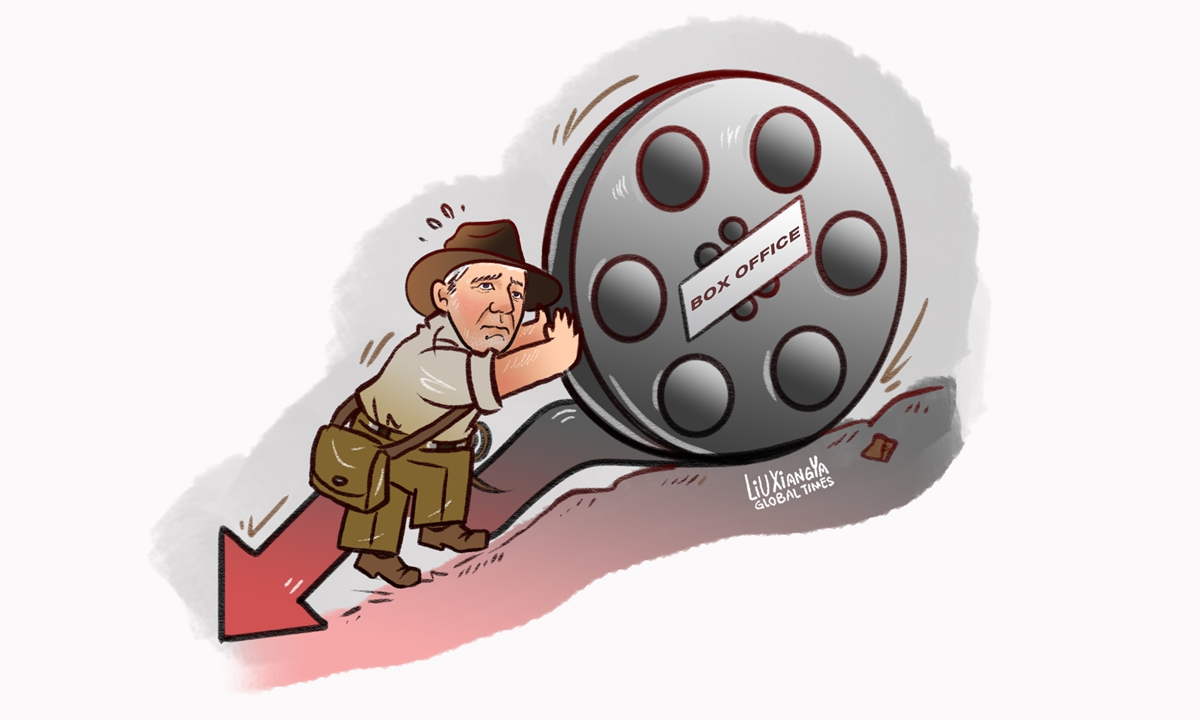ARTS / FILM
Hollywood fatigue forebodes total collapse of the box office

Illustration: Liu Xiangya/Global Times
The latest installment in the iconic Hollywood action-adventure Indiana Jones series, Indiana Jones and the Dial of Destiny (shortened as Indiana Jones 5), was released in China and North America on Friday, a major highlight of the summer.Despite being Harrison Ford's final portrayal of Dr Henry Walton "Indiana" Jones, the film is experiencing lower-than-expected box-office numbers.
In its first three days of release in the Chinese mainland, the film only grossed 14.933 million yuan ($2.06 million). Media outlets like Deadline of the US have predicted that the film's opening weekend box office in North America will be around $60 million, significantly lower than the previous installment's $100 million, resulting in a global opening of just $140 million.
However, this "vibrant" new installment directed by James Mangold is reviewed poorly compared to its predecessors, indicating that audiences are experiencing "aesthetic fatigue" with traditional genre films.
With a reported production budget of $295 million, Indiana Jones 5 is the most expensive installment in the Indiana Jones franchise to date. If production costs and theater revenue sharing are taken into consideration, the film would need to earn at least $800 million to break even, making it highly likely that the film will be another loss-making venture for Disney this year.
In comparison, the first film in the series, released in 1981, had a budget of $20 million and grossed $389 million worldwide.
The protagonist of the series, Indiana Jones, is an archaeologist who travels the world. The franchise originated from George Lucas' early 1970s concept and has withstood the test of time in Hollywood, leaving a lasting impact on film culture. It was one of the most beloved film series among audiences in the 1980s.
So why has the golden age of action films from the 1980s fallen behind today? The main reason is that traditional adventure movies are on the decline, with predictable plotlines and action sequences that significantly reduce their appeal. Even the introduction of new elements like time travel and changing history has become repetitive for audiences.
Indiana Jones appeals mostly to people in their 40s and 50s, but how many of them still go to movie theaters? After reaching the peak decades ago, this old-fashioned adventure franchise has lost its luster.
Another film suffering a similar fate is The Flash, representing the superhero genre. Despite positive reviews, The Flash failed to match box-office expectations, creating embarrassment for director Andy Muschietti. The film premiered in 4,234 cinemas in North America on June 16, grossing only $55.1 million in its opening weekend. In the Chinese mainland, it has only earned a mere 181 million yuan in 17 days.
With the intense competition of major releases during the summer season in North America, it remains unknown whether The Flash can surpass $300 million at the worldwide box office. For a superhero film with a production budget close to $300 million, significant losses are inevitable. Warner Bros and DC Comics have struggled to produce successful films within the DCEU (DC Extended Universe) over the past decade. Besides James Wan's Aquaman, the only film to gross over $1 billion globally, the entire DCEU has largely been characterized by financial losses.
Looking at The Flash, whether you bring in Ben Affleck or George Clooney as Batman, it remains questionable whether these elements can truly resonate with the young Chinese moviegoers who now form the majority of superhero film viewership.
The saturation of concepts like "multiverse" and "parallel timelines" in superhero films has led to a lack of novelty for audiences. Coincidentally, the animated film Spider-Man: Into the Spider-Verse also explored similar themes. Hollywood is now facing an uncertain future.
Previously, some Western media outlets claimed China was suppressing Hollywood blockbusters. However, the recent performance of so many Hollywood releases in China contradicts this claim. This summer, we have witnessed a series of failures among Hollywood blockbusters, including the box-office collapse of The Flash and the failure of Transformers: Rise of the Beasts.
Indiana Jones 5 only further raises concerns about the declining fortunes of Hollywood blockbusters.
Hollywood blockbusters, especially those released after the pandemic, have visibly declined in quality. Beneath the flashy special effects, the dated universality of the US' prevailing values is becoming more apparent.
As Hollywood becomes increasingly out of touch and indulges in "political correctness" without knowing when to stop, classic IPs must be squeezed bone-dry before they are discarded. This has led to severe audience fatigue with Hollywood films and forebodes the total collapse of the box office.



